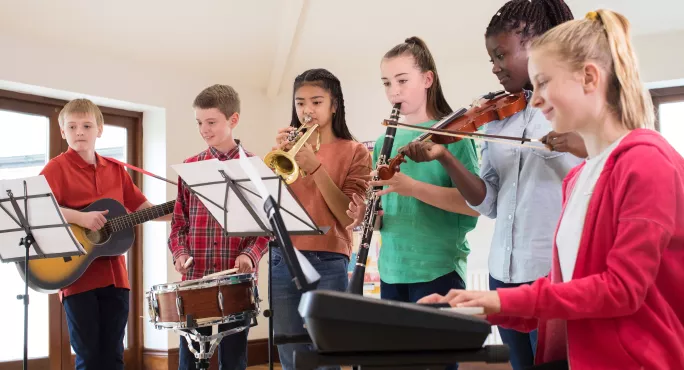- Home
- ‘Thousands’ of peripatetic music teacher jobs ‘at risk’
‘Thousands’ of peripatetic music teacher jobs ‘at risk’

Two major music associations are warning thousands of teachers’ jobs could be at risk if the government does not pledge more money for music education hubs.
The Incorporated Society of Musicians (ISM) and Music Mark have clubbed together to call for more funding for the hubs - which employ more than 12,000 peripatetic teachers.
They warn the current allocated funding is “simply not enough” to secure the future of the network - and should be increased to at least £100m per annum for the next five years.
The current funding settlement for music education hubs runs out on 31 March 2020, and no further investment has yet been confirmed.
Quick read: GCSEs: Creative subjects ‘may vanish in state schools’
Viewpoint: ‘Music should be the beating heart of primary’
Research: ‘Swapping Mozart for Stormzy boosts literacy and numeracy’
The associations are backed by roughly 200 professional musicians, teachers and academics, including the famous conductor Sir Simon Rattle, who have signed an open letter calling on the government to confirm its funding commitment “as soon as possible”.
“Music education in the classroom is already in crisis,” the letter states.
“Without this funding, this additional provision will also either be drastically cut or parents and schools will face the rising costs.”
Music education hubs are groups of organisations working together across local authority areas. They often involve schools and community groups, and seek to augment and support music education.
The network was introduced in 2012 as part of the National Plan for Music Education, and has since amassed 121 hubs.
The government announced in January 2019 that it would refresh the plan, but that work has yet to be completed.
It has, however, committed to a significant increase in funding for schools by 2022-23.
Deborah Annetts, chief executive of ISM, said it is “vital” that there is no gap in funding while future plans are drafted.
“Without the government’s continuous investment over the past seven years the work of the music education hubs to ensure more equitable opportunity would not have been possible,” she said.
“However it is vital there is no gap in funding whilst the plan is being ‘refreshed’ and that the government confirms its commitment to music education hubs from April 2020 as soon as possible.
“As it currently stands, peripatetic teachers - thousands of which the ISM represents - are at risk of redundancy as music education hubs are put at financial risk.”
Bridget Whyte, chief executive of Music Mark, added: “While we are grateful for the government’s investment over recent years into music education hubs, the current allocated funding is simply not enough to ensure the future of music education hubs and equitable access for all children to the opportunities within the National Plan for Music Education.
“Parents and schools cannot, and should not, be expected to cover the increased shortfall. Therefore, we call on the government to agree a realistic ongoing settlement for the delivery of its aspirations for music education hubs.”
Backing the call for more funding, Simon Toyne, president of the Music Teachers’ Association, said the hubs are “more important than ever”.
“Music Education Hubs play a vital role in supporting curricular and extra-curricular music provision in schools, including providing group and one-to-one tuition, and in developing vibrant musical communities,” he said.
“In increasingly pressured times financially, their responsibility for giving sustained musical opportunities to young people from all backgrounds is more important than ever.
“The Music Teachers’ Association welcomes this call for increased funding to secure the future of an extremely valuable part of music education and those who deliver it.”
A Department for Education spokesperson said the department is “committed to refreshing the national plan for music education,” but did not specify how much funding, if any, it would be pledging - or when this would be rolled out.
“Music is compulsory in the national curriculum from the age of 5 up to 14 and since 2010 the proportion of pupils taking music GCSE has remained broadly stable,” they said.
“Through our Music Hubs programme, more than 700,000 children learnt to play instruments in class together in 2016/17 and we are putting more money into arts education programmes than any subject other than PE - nearly half a billion pounds to fund a range of music and cultural programmes between 2016 and 2020. This money is in addition to the funding that schools receive to deliver their curriculum.
“We are committed to refreshing the national plan for music education, consulting widely, and are also develop a high-quality model music curriculum.”
Keep reading for just £1 per month
You've reached your limit of free articles this month. Subscribe for £1 per month for three months and get:
- Unlimited access to all Tes magazine content
- Exclusive subscriber-only stories
- Award-winning email newsletters



